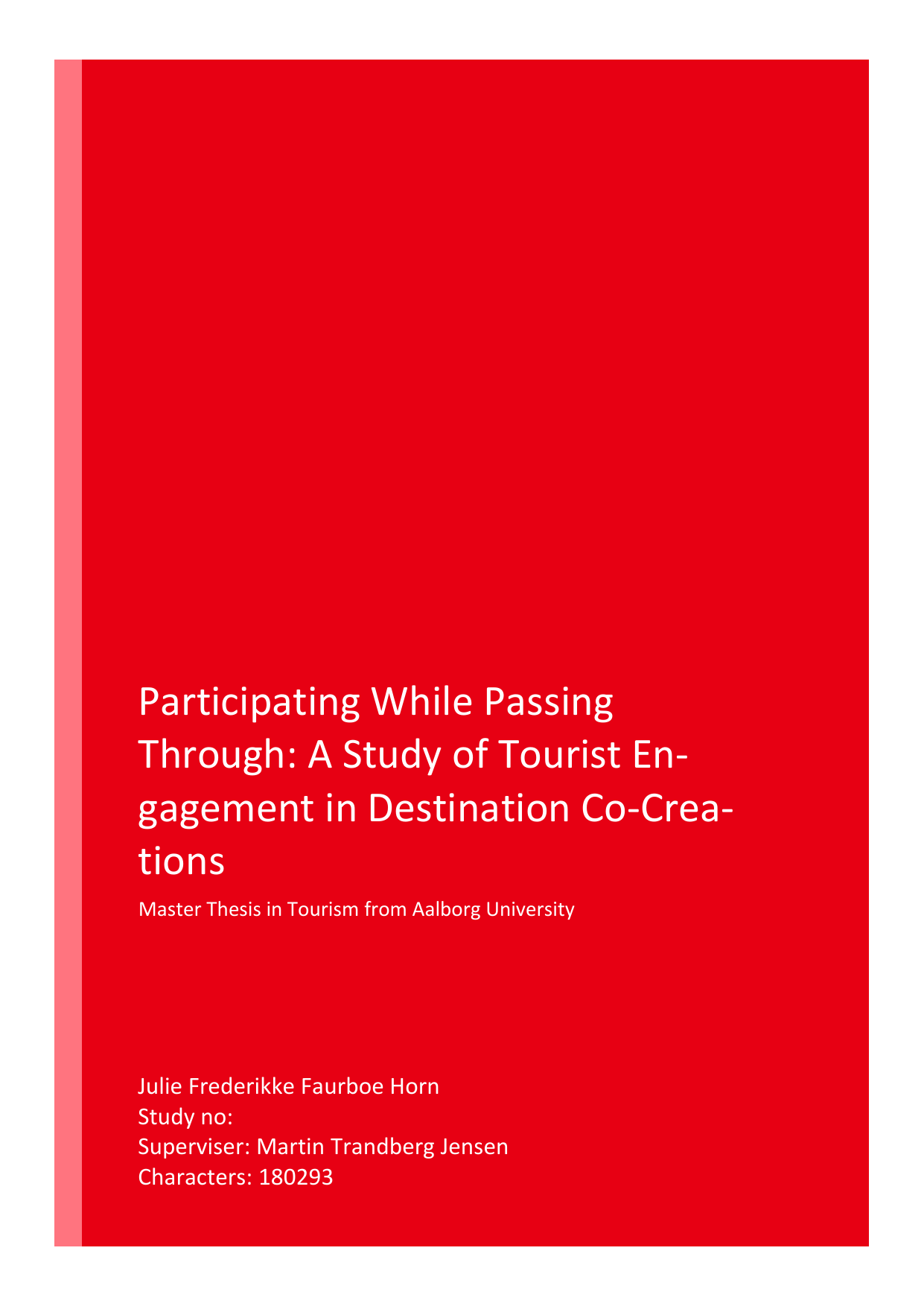
Participating While Passing Through - A study of tourst engagement in destination Co-creation
Term
4. term
Education
Publication year
2025
Submitted on
2025-06-02
Pages
75
Abstract
This thesis investigates how tourists relate to the idea of being involved in the development of a destination—and to what extent they are willing to contribute to the co-creation of the places they visit. While co-creation has become an increasingly influential concept in tourism research and practice, much of the existing literature is grounded in provider- or destination-centric perspectives. Tourists are often positioned as latent collaborators, yet little empirical research has explored how they perceive such roles. This thesis seeks to address this gap by combining a theoretically informed framework with qualitative interviews conducted with international tourists in Copenhagen. The literature review demonstrates that co-creation in tourism has evolved from focusing on experi-ence creation to including strategic processes such as branding, planning, and product development. This shift has prompted a distinction between experiential and strategic co-creation. The former relates to active engagement in on-site experiences, while the latter implies more deliberate contri-butions to the destination’s long-term form and function. Tourists are increasingly recognized as empowered and networked actors, yet their willingness to participate in strategic processes remains understudied. The thesis employs a theoretical framework combining co-creation theory, motivation theory, and tourist typologies to explore this. This enables a multi-layered analysis of how tourists understand the idea of participation (co-creation), what motivates or hinders their engagement (motivation), what kinds of tourists are likely to participate, and in which ways (typologies). The empirical basis consists of 14 qualitative interviews conducted in Copenhagen. The findings reveal that tourists do not relate to participation as a binary choice but rather as a spectrum shaped by factors such as for-mat, language, perceived relevance, and emotional investment. Many tourists are willing to contribute—particularly through sharing feedback or ideas—when par-ticipation is presented informally and embedded in their travel experience. However, terms such as “development,” “planning,” or “workshop” create distance, as they signal responsibility or strategic intent that tourists often reject. This distinction between participation and involvement becomes analytically central: while many are willing to participate, few are genuinely involved cognitively or emotionally. The thesis develops a typology of three ideal-typical role understandings: the pragmatic improver, the experience-oriented participant, and the reluctant observer. These types highlight differences in motivation, preferred formats, and perceived legitimacy. Participation becomes meaningful when it aligns with the tourist’s sense of role, autonomy, and travel context. Importantly, co-creation is more likely to succeed when it does not feel strategic or formalized to the tourist. This creates a paradox: the less strategic co-creation feels, the more effective it may be as a strategic tool. The thesis contributes to tourism research by offering new insights into how tourists position them-selves concerning co-creation and emphasizing the importance of framing, language, and relational meaning in shaping tourist engagement.
This thesis investigates how tourists relate to the idea of being involved in the development of a destination—and to what extent they are willing to contribute to the co-creation of the places they visit. While co-creation has become an increasingly influential concept in tourism research and practice, much of the existing literature is grounded in provider- or destination-centric perspectives. Tourists are often positioned as latent collaborators, yet little empirical research has explored how they perceive such roles. This thesis seeks to address this gap by combining a theoretically informed framework with qualitative interviews conducted with international tourists in Copenhagen. The literature review demonstrates that co-creation in tourism has evolved from focusing on experi-ence creation to including strategic processes such as branding, planning, and product development. This shift has prompted a distinction between experiential and strategic co-creation. The former relates to active engagement in on-site experiences, while the latter implies more deliberate contri-butions to the destination’s long-term form and function. Tourists are increasingly recognized as empowered and networked actors, yet their willingness to participate in strategic processes remains understudied. The thesis employs a theoretical framework combining co-creation theory, motivation theory, and tourist typologies to explore this. This enables a multi-layered analysis of how tourists understand the idea of participation (co-creation), what motivates or hinders their engagement (motivation), what kinds of tourists are likely to participate, and in which ways (typologies). The empirical basis consists of 14 qualitative interviews conducted in Copenhagen. The findings reveal that tourists do not relate to participation as a binary choice but rather as a spectrum shaped by factors such as for-mat, language, perceived relevance, and emotional investment. Many tourists are willing to contribute—particularly through sharing feedback or ideas—when par-ticipation is presented informally and embedded in their travel experience. However, terms such as “development,” “planning,” or “workshop” create distance, as they signal responsibility or strategic intent that tourists often reject. This distinction between participation and involvement becomes analytically central: while many are willing to participate, few are genuinely involved cognitively or emotionally. The thesis develops a typology of three ideal-typical role understandings: the pragmatic improver, the experience-oriented participant, and the reluctant observer. These types highlight differences in motivation, preferred formats, and perceived legitimacy. Participation becomes meaningful when it aligns with the tourist’s sense of role, autonomy, and travel context. Importantly, co-creation is more likely to succeed when it does not feel strategic or formalized to the tourist. This creates a paradox: the less strategic co-creation feels, the more effective it may be as a strategic tool. The thesis contributes to tourism research by offering new insights into how tourists position them-selves concerning co-creation and emphasizing the importance of framing, language, and relational meaning in shaping tourist engagement.
Keywords
Documents
